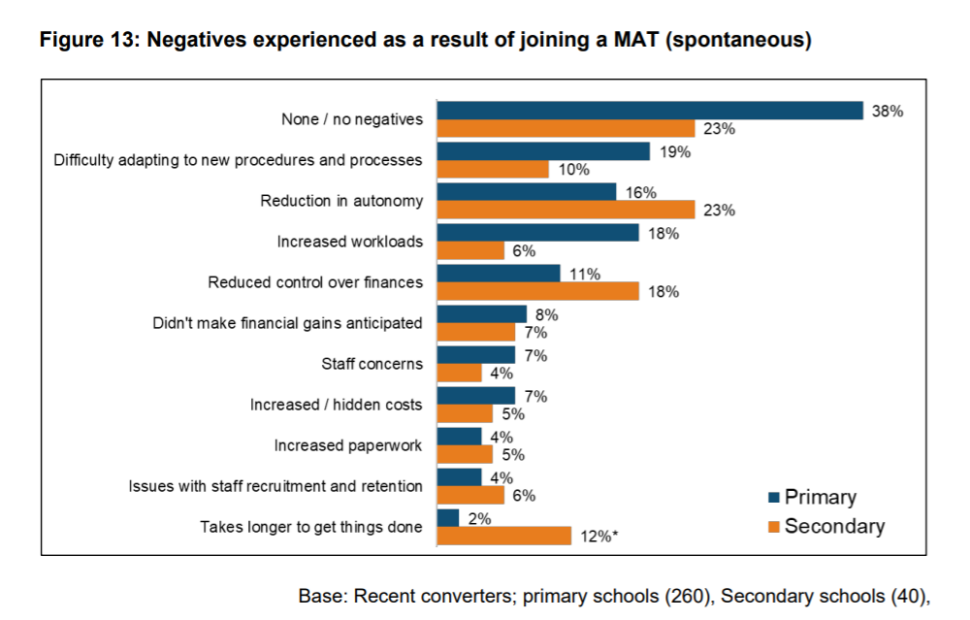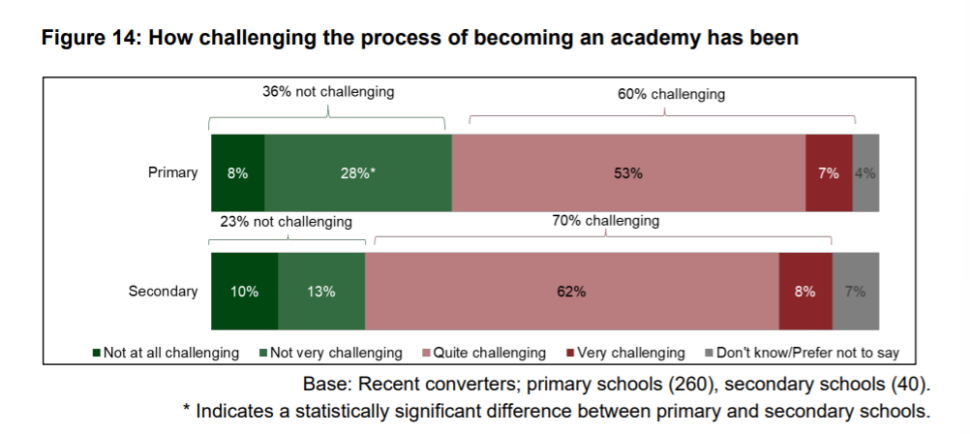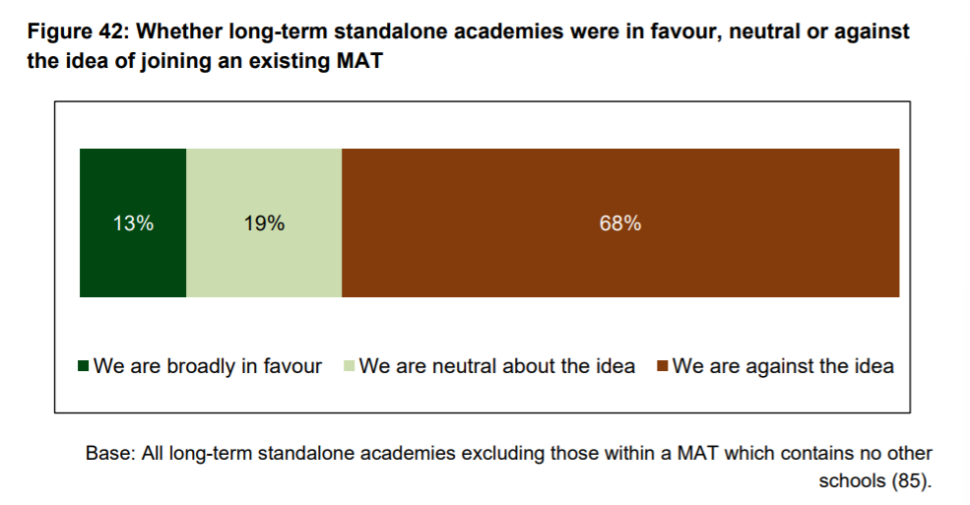The rate of academy conversions in the next three years will be “limited to a steady rate” and is “unlikely to increase” without any change to current policies, new research says.
The Department for Education has published a research report on schools’ views on joining a multi-academy trust.
Former education secretary Gavin Williamson said the department’s “vision” was for all schools to join a MAT.
Researchers interviewed 300 LA-maintained schools, 300 recent converters in MATs and 100 standalone academies in June and July this year.
Here’s the report’s key findings…
1. Most converters said change had ‘positive impact’ …
The vast majority of recent converters – 82 per cent of primary schools and 74 per cent of secondary schools – said the overall impact of joining a MAT had been positive.
But four percent of primary and six per cent of secondary schools were negative about the “overall impact”.
Most schools – 60 per cent at primary and 73 per cent at secondary – said that increasing collaboration was a key reason for joining a MAT.
Secondary schools were more likely to report significant improvements to the school’s reputation and image (18 per cent compared with 6 per cent) and the quality of school governance (32 per cent compared with 16 per cent).
But primaries were more likely to have experienced big improvements on sharing of skills (51 per cent compared with 34 per cent).
DfE said that improvements in the school’s sense of direction, training of staff and quality of leadership were all experienced “more frequently” than had been anticipated.
This suggested “there is potential to increase awareness and raise expectations of these benefits amongst schools that are not part of MATs”.
2. … but there were also negatives
Of the recent converters, only four in ten primary schools (38 per cent) and 23 per cent of secondaries said there had been no negatives.
For primary schools, difficulty adapting to new processes (19 per cent) increased workloads (18 per cent) and reduction in autonomy (16 per cent) were the biggest negatives.

For secondaries, the reduction in autonomy (23 per cent), reduced control over finances (18 per cent) and taking longer to get things done (12 per cent) were the biggest drawbacks.
3. Conversion process also ‘challenging’
Most recent converters – 60 per cent of primaries and 70 per cent of secondaries – did find the process “challenging”.
For those that found the process the hardest, the main difficulty was increased workload or time spent on the process (30 per cent of primary schools and 23 per cent of secondaries).

A quarter of primaries found that dealing with objections from parents or staff (25 per cent) and the volume of paperwork (22 per cent) had made the process difficult.
DfE said that support and guidance was “mostly seen to be useful”. “Some suggested the department’s guidance would benefit from simple practical advice (e.g. with useful ‘dos and don’ts’),” it adds.
4. Few schools plan to join a MAT (with loss of autonomy big sticking point)
Schools Week has previously revealed the low numbers of schools now looking to academisation. The DfE report backs this up, showing only 13 per cent of local authority primaries and 22 per cent of LA secondaries were considering converting to academy status.
The vast majority – 94 per cent of primary and 87 per cent of secondaries – felt there would be negatives linked with converting, with “loss of autonomy and culture” the most frequent concern.
But there seems to be more appetite among single-academy trusts. Around a third of standalone academies (35 per cent) were currently considering forming or joining a MAT in the next two years.

Two thirds – 66 per cent – said that not joining a MAT was an “active decision” from the school. One in five – 21 per cent – felt that other MATs were unsuitable.
Meanwhile, 68 per cent of SATs said they were against the idea of joining an existing MAT.
DfE said that this suggests “the rate of conversions in the coming two to three years to academies will be limited to a steady rate and is unlikely to increase without any change to current policies”.
5. ‘Evidencing positives’ critical, says DfE
The report concludes that schools not in MATs could see the benefits, but they felt these would not outweigh their concerns.
It adds that if the department wants to implement its vision of having all schools in a strong MAT then “evidencing the positive experiences of schools in MATs will be critical”.
“There were some benefits experienced by recent converters more frequently than they had been anticipated, so there could be value in broadening awareness of these,” the report added.
Researchers also said the positive findings “suggest that the downsides associated with any loss of autonomy experienced was outweighed by the benefits”.
“To reach their aim, the department may want to consider communications that emphasise these positive aspects of being part of a MAT, and how recent converters feel these outweigh any lost autonomy.”
Academies minister Baroness Barran (pictured above) told the Schools and Academies Show today that she wants to “tackle” apprehension from schools about converting.
She added: “My argument today is a simple one: if all schools benefit from the support and opportunities that come with being part of a strong multi-academy trust, we can create a system that works for all children… one that is agile in response to their needs and gives them the tools to take on the decades that lie before them.”
















The Government has stressed the ‘advantages’ of academy conversion for over a decade. The main positive was gaining ‘freedom’. But this was a false promise. It’s become increasingly apparent that joining a MAT means giving up autonomy. Even stand-alone trusts have the increased burden of complying with company and charities law. Given this debunking of one of the main advantages of academy status, any further promotion of academy status from a few compliant schools will be greeted with a snort of scepticism.